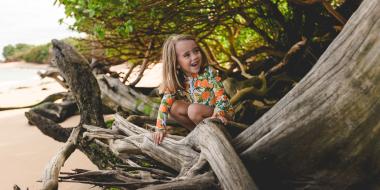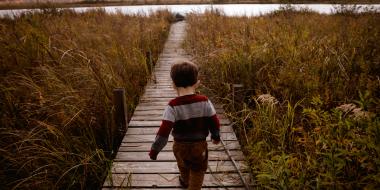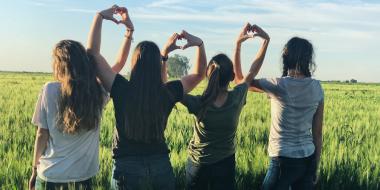“Whose child is that?” a mother said to me while pointing towards the school field. Before I even glanced in the direction of her finger, I looked for the closest escape route. More often than not, my children, known on our suburban playground as the “crazy country bumpkins,” are usually the ones that get pointed at. Finding no clear opportunity to leave the situation, I glanced casually at the field to witness my youngest son attempting to take flight. He had taped countless feathers to both his hands and arms, and he was waving them wildly, leaping and smiling. According to his professional calculations, the wind was just strong enough for him to finally take off, and in his mind, he did.
For almost six years, my son has insisted that he is part bird. His behaviours began with the enthusiastic identification of every single bird species we encountered. Then various chirping sounds could be heard around the house, and at night, I would find him sleeping in a nest made out of bedsheets. I knew things were getting serious, though, when my son made a nest in a friend’s backyard, and sitting in the middle was her daughter, waiting for the eggs my son promised her to hatch. But, I did not really believe that his bird-like behaviours were anything more than an imagination gone wild until my son’s caregiver brought his uniqueness to my attention. After observing him a little more intently, I knew that she was right. Strange as it may sound, he had a gift.
What my son’s caregiver made glaringly obvious to me was my son’s high naturalistic intelligence. According to Howard Gardner’s theory of “multiple intelligences,” children with a high naturalistic intelligence possess a heightened awareness of the natural world (including being very sensitive to loud sounds, tastes, and sensory experiences), choose to play outside over anything else, enjoy nature movies, have a natural empathy towards all creatures, “water” trees by relieving themselves outdoors (the only way my son would give up his diapers), have many collections of natural objects, and notice things that others often miss. These personality traits could be characterized as good or bad, depending on your values.
I must admit I sometimes get nauseous when my children bring home collections of objects that they have discovered on walks, especially because they do not differentiate between trash and treasures. To them, they are one and the same. If it shines, smells, or is dead and squishy, all the more reason to collect it. On one particular day, my son came home from a neighbourhood walk with a vast array of objects. Trying to evade the pleas to keep the collection in his room, I quickly ran into the house without inspecting what he found. Ignoring the “keep your lovely discoveries outside” rule, he brought them into the house and placed them on a silver pie plate in the laundry room.
When my husband came home, he smelled a distinct odor coming from the plate. He called me to take a look at the objects, and although I dreaded smelling the skeleton of a bird or the insole from a shoe, I was surprised to find in the middle of the collection of odds and ends a neat and tidy bag of marijuana! Curious as to why my son would find this illegal substance so alluring (and where he would find it at all!), I asked him why he chose to collect this particular object. Thinking that I would get some insight into my neighbour’s private affairs, I was instead surprised with his response, “It’s a Father’s Day present for daddy!” Although he was grateful, my husband was not one to engage in pot smoking, so the compost pile had an extra boost that year instead. But, I did start to wonder if my son’s “naturalist” intelligence was beginning to get out of hand.
This ability to “become” another animal, plant, insect or bird may increase a child’s self-esteem, confidence, and compassion towards others.
The good news is that parents do not need to worry, as this intelligence truly is a gift that every person possesses. Research states that children who have high naturalistic intelligence have an increased ability to nurture, empathize, see patterns and be creative. David Sobel, an author-educator, also says in his book, Ecophobia, that this ability to “become” another animal, plant, insect or bird may increase a child’s self-esteem, confidence, and compassion towards others, not to mention, his or her overall health and wellbeing.
Luckily, it can be increased quite simply. In fact, most children are born part bird, or part fish or part-whatever, so the fundamental way to increase this intelligence is by allowing children to identify with the creature that inspires them the most and let them play outside freely. By going outside, children will naturally begin to develop this innate intelligence and start to understand the creative lessons from their chosen creature or creatures. But the lessons don’t need to stop there. On rainy or cold days, let them take out books from the library about their creature, or journal about it or watch movies about it. These special creature days will help children identify patterns between all creatures while also encouraging them to see beyond just their own backyard.
Developing this in a child may require some patience. We have been known to be late for school because we needed to save the drowning worms from the pathway, and I have given up trying to make sure my children make it to school clean. With dirt under their nails and brown spots on their knees, some parents look at me with disappointment, yet others are curious about what my children have been up to. There is a sense of satisfaction on my children’s faces and an inner confidence that comes with knowing that they were solely responsible for saving the lives of other living creatures. Their smiles remind us all to be brave enough to trust our inner mother bird instincts.
By educating children in a way that encourages naturalistic intelligence, parents can ensure that their children live up to their fullest potential. Through the flapping of taped feathers and the building of nests, my son could be on his way to developing a new flying machine or inventing a new structure that can withstand great winds. Who knows what the future generations may create? I just know that I don’t want to be the one to dampen the creativity and compassion of the next generation, even if it means a house full of “treasures,” bird feathers, empty tape dispensers, controlled substances, and all.
*Originally published March 1, 2013






